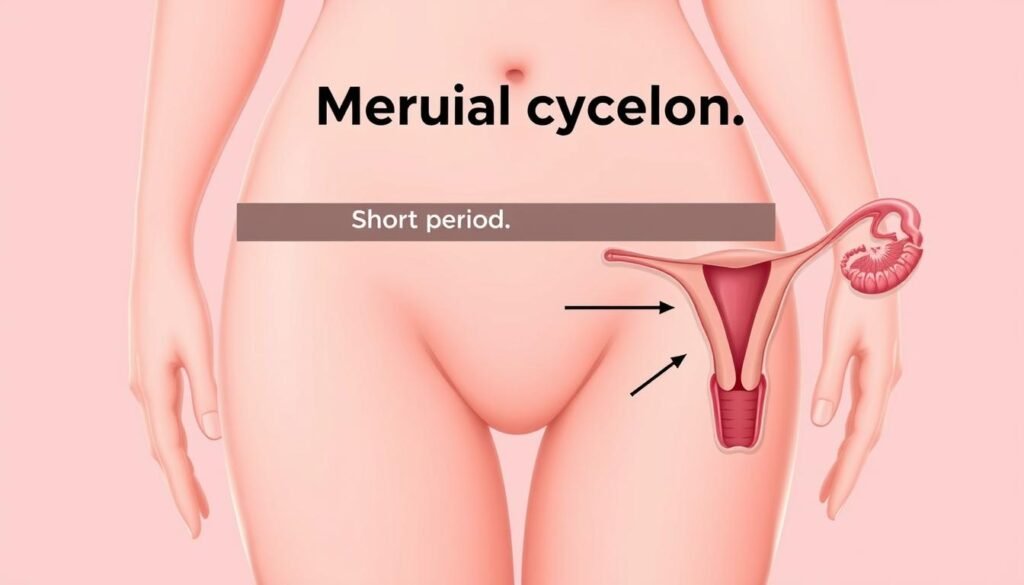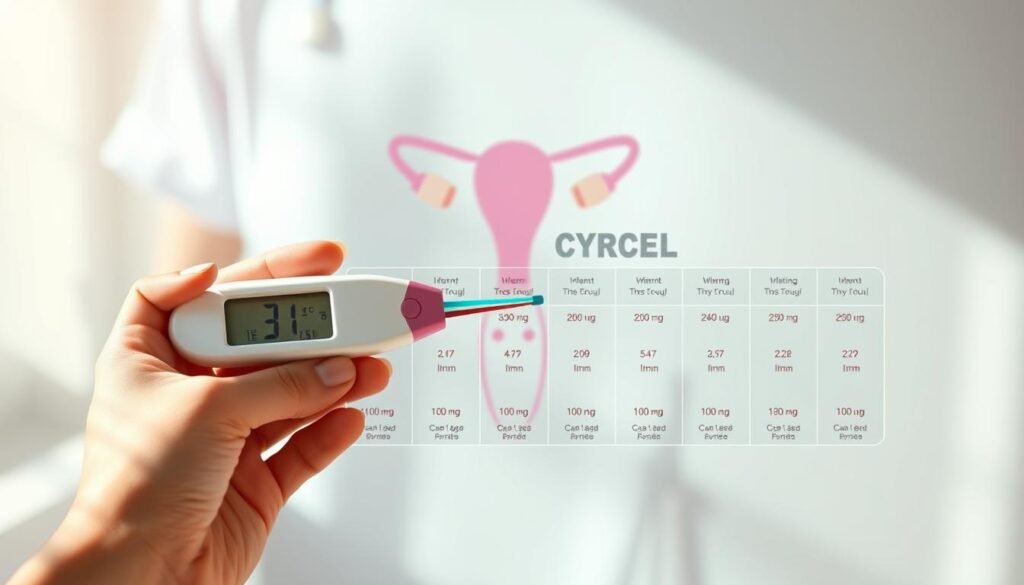How Long Do Periods Last?
Did you know the average menstrual cycle is 28 days? It can be 21 to 35 days too. Many women don’t know what a normal menstrual cycle length is. Menstruation is when the uterus sheds its lining every month.
It’s important to take care of your health. Knowing the average period duration helps spot any problems. Knowing your body’s cycles is key to staying healthy.
Key Takeaways
- The average menstrual cycle lasts 28 days.
- Cycles can range from 21 to 35 days.
- Understanding your cycle is key to reproductive health.
- Irregularities can be a sign of underlying health issues.
- Being proactive about your health is important.
The Basics of Menstruation
Menstruation is a natural part of life for women. It’s all about hormones working together. Knowing this helps us understand the female body better.
What Happens During Menstruation
When you menstruate, your body sheds the lining of your uterus. This happens if you’re not pregnant. It’s all about hormones working together.
The Role of Hormones in Your Cycle
Hormones are key in your menstrual cycle length and period duration. The main ones are estrogen and progesterone.
Estrogen and Progesterone Fluctuations
Estrogen goes up at the start of your cycle. It makes the uterine lining thicker. After ovulation, progesterone kicks in to keep the lining ready.
If you don’t get pregnant, these hormone levels drop. This leads to your period.
It’s important to take care of your health. Don’t ignore changes in your menstrual flow duration or cycle.
| Hormone | Role | Effect on Menstruation |
|---|---|---|
| Estrogen | Promotes uterine lining thickening | Rises during the first half of the cycle |
| Progesterone | Maintains uterine lining | Increases after ovulation |
How Long Do Periods Last? The Average Duration
Knowing how long periods last is key for menstrual health. Many women wonder about the average period duration. It’s important to know what’s normal.
Typical Timeframes for Menstruation
Most periods last between three and seven days. The first two days are usually the heaviest. Each person’s period length in days can be different.
What’s Considered Normal Period Length
A typical period duration is 3 to 7 days. But what’s normal can vary. Health, lifestyle, and hormones all affect period length.
Flow Patterns Throughout Your Period
Flow patterns change during your period. The first two days are usually the heaviest. Then, the flow gets lighter. Knowing your flow patterns helps you understand your menstrual health.
Being proactive about your health is important. If you’re worried about your period, don’t wait to get checked. Knowing your cycle and any changes helps keep you healthy.
The Complete Menstrual Cycle Timeline
The menstrual cycle is more than just bleeding. It’s a monthly process that gets the body ready for pregnancy. Knowing this cycle helps us understand its phases and how they affect our health.
The Four Phases Explained
The menstrual cycle has four main parts: menses, follicular, ovulation, and luteal.
- Menses: This phase is when the uterine lining sheds, causing menstrual bleeding.
- Follicular: Here, the body makes follicle-stimulating hormone (FSH). It helps the ovaries grow follicles.
- Ovulation: A big jump in luteinizing hormone (LH) makes an egg come out from the biggest follicle.
- Luteal: After ovulation, the empty follicle turns into the corpus luteum. It makes progesterone to get the uterine lining ready for an egg.
Cycle Length Variations
Cycle length can change a lot among women. It usually ranges from 21 to 35 days. Things like stress, lifestyle, and health can affect it.
Tracking Your Unique Cycle Pattern
It’s important to track your menstrual cycle. This helps you understand your own pattern. You can use a period tracking app, calendar, or just pay attention to how you feel. This way, you can get ready for your periods better.
Being proactive about your health is vital. Don’t delay getting tested if you have concerns about your menstrual cycle.
Period Duration Across Different Life Stages
It’s important to know how periods change as we grow older. Menstrual cycles can change a lot with age. This is due to hormonal changes and our overall health.
First Periods in Adolescence
Adolescence is a time when periods can be unpredictable. Girls may have longer or shorter periods as their bodies adjust. It usually takes a few years for periods to become regular.
Changes During Your 20s and 30s
In your 20s and 30s, periods tend to be more regular. The average period lasts between 3 to 7 days. But, lifestyle, stress, and health can affect how long your period is.
Perimenopause and Period Length
As women get closer to menopause, in their 40s, hormonal changes can affect periods. Cycles may get longer or shorter, and flow can change too. It’s key to track these changes to know what’s normal for you.
Staying on top of your health is very important. If you notice big changes in your period, get checked out. Knowing about menstrual cycle changes can help spot health issues early.
Factors That Influence How Long Periods Last
Many things can change how long a period lasts. Every woman’s experience is different. Knowing what affects your period is key to managing your health.
Hormonal Birth Control Effects
Hormonal birth control, like the pill or patch, can change your period. It changes your body’s hormones, which can make your period lighter or shorter. But, it can also make your period irregular or last longer for some women.
Impact of Stress and Lifestyle
Stress and your lifestyle can also change your period. Things like diet, exercise, and feeling well can affect it. High stress can mess with your hormones, changing your cycle. Eating right and exercising can help keep your cycle regular.
Medical Conditions That Alter Period Duration
Some health issues can change how long your period lasts. For example, problems with hormone production can change your cycle.
Thyroid Disorders and Menstruation
Thyroid problems, like too little or too much thyroid hormone, can affect your period. Thyroid hormones help your body work right. If they’re off, your period can change. For more on how thyroid issues affect menstruation, check Medical News Today.
| Factor | Impact on Period Duration |
|---|---|
| Hormonal Birth Control | Can cause lighter and shorter periods or irregular bleeding |
| Stress and Lifestyle | Can disrupt hormonal balances, leading to variations in cycle length |
| Thyroid Disorders | Can alter menstrual cycle length and characteristics |
Looking after your health is important. If your period changes, don’t wait to get checked.
Short Periods: When to Be Concerned
Short periods can worry many women. While it’s normal for periods to vary, very short ones might mean there’s a problem.
Normal Causes of Brief Periods
Many things can make periods shorter. Hormonal shifts, stress, and lifestyle choices are some. For some, it’s just how their cycle goes.
Medical Reasons Behind Shortened Menstruation
But, short periods can also hint at health issues. Problems like PCOS, thyroid issues, or hormonal imbalances might be the reason. It’s key to remember that changes in menstrual flow duration can show how well you’re doing health-wise.
Pregnancy and Short Periods
Pregnancy is another thing to think about. Short periods can sometimes mean you might be pregnant early or have pregnancy problems. For more on the menstrual cycle, check out Mayo Clinic’s guide on menstrual cycles.

Looking after your health is important. If your periods are always short or you notice other odd symptoms, don’t delay getting checked.
Extended Periods: Causes and Solutions
Long menstrual periods might mean there’s a health issue. Most periods last 3 to 7 days. But, some women have bleeding that lasts longer and worries them.
Defining Abnormally Long Periods
A period is long if it’s over 7 days. But, what’s normal varies a lot. Health, lifestyle, and when you’re in your cycle can change how long your period is.
Health Conditions Associated with Prolonged Bleeding
Many health issues can make periods last longer. Hormonal problems, uterine fibroids, and endometriosis are some examples.
Endometriosis and Fibroids
Endometriosis makes tissue grow outside the uterus, causing long and painful periods. Fibroids are growths in the uterus that can also make bleeding last longer.
“It’s so vital to be proactive about your health. Do not put off getting tested.”
Long periods can be a sign of health issues like endometriosis and fibroids. If your periods are longer than usual, see a doctor. They can check for any health problems.
Tracking Your Period Duration and Flow
Watching your menstrual cycle and flow can show patterns and oddities. This lets you take steps for your reproductive health.
Effective Methods for Period Tracking
There are many ways to track your period. You can use a diary or apps for menstrual health. Digital tools send reminders and give insights from your data.
What Information to Record
When tracking your period, write down the start and end dates. Also, note how heavy your flow is and any symptoms. Remember to include your diet, exercise, and stress levels too.
Using Technology to Monitor Menstrual Health
Many apps help track your menstrual cycle. They can predict when your next period will be and when you might get pregnant. These apps are great for spotting irregularities.
| Feature | Manual Tracking | Digital Tracking |
|---|---|---|
| Reminders | No | Yes |
| Data Analysis | Limited | Yes |
| Ease of Use | Variable | High |
When to Consult a Healthcare Provider
If you’re worried about how long your periods last, it’s key to know when to see a doctor. Your period length can show how healthy you are. If it’s way off from the usual, you might need to see a doctor.
Red Flags in Period Duration
Some changes in your cycle can mean you have a health problem. For example, if your periods are much shorter or longer than 3 to 7 days, it could be a sign of hormonal issues or other health problems. It’s important to watch your cycle and remember any lasting changes.
| Red Flag | Possible Cause |
|---|---|
| Periods lasting more than 7 days | Hormonal imbalance, uterine fibroids |
| Periods lasting less than 3 days | Premature ovarian failure, hormonal imbalance |
| Irregular cycle length | Polycystic ovary syndrome (PCOS), stress |
Preparing for Your Doctor’s Appointment
Before you see a doctor, track your menstrual cycle and any symptoms or changes. This info is very helpful for your doctor to understand your situation.
Important Symptoms to Report
- Changes in period duration or flow
- Severe cramping or pain
- Irregular cycle patterns
- Other symptoms like bloating or mood swings
Being proactive about your health is vital. Don’t wait to get medical help if you notice any odd changes in your menstrual cycle. 
Treatment Options for Abnormal Period Duration
It’s important to know how to treat abnormal period duration. This helps keep your menstrual health good. Problems withperiod durationcan really affect your life. So, it’s key to look into treatments.
Medical Interventions Available
Medical help is often needed for issues causing abnormal menstrual cycle length. Hormones and medicines can make periods regular again.
Hormonal birth control can fix hormonal problems. These problems might make your period duration irregular.
Lifestyle Changes That Can Help
Changing your lifestyle can also help with typical period duration. Eating right, managing stress, and exercising can make your periods more regular.
Nutritional Approaches to Period Regulation
Eating well is a big part of lifestyle changes. A diet full of good nutrients can help control your menstrual cycles.
Don’t wait to take care of your health. Talking to a doctor can help find the right treatment for abnormal period duration.
Being Proactive About Your Menstrual Health
Being proactive about your menstrual health can lead to better overall health outcomes. Your menstrual cycle is a vital indicator of your overall well-being. Regular monitoring and check-ups can help identify any irregularities or issues early on.
The Importance of Regular Check-ups
Regular check-ups with your healthcare provider are key for good menstrual health. These visits help spot any issues early, like irregular period duration or abnormal menstrual cycle length. Your healthcare provider can guide you on managing your menstrual health well.
Advocating for Proper Testing and Care
It’s vital to advocate for proper testing and care in your menstrual health. Know what a normal average period duration is and watch for any changes that might mean a health issue. Being proactive ensures you get the care and treatment you need.
Building a Supportive Healthcare Team
Building a supportive healthcare team is important for your menstrual health. Find healthcare providers who listen and know about menstrual health. Here are some steps to build a supportive team:
- Research healthcare providers who specialize in women’s health.
- Ask questions during your visits to understand your health better.
- Keep a record of your menstrual cycle to share with your healthcare provider.
By taking these steps, you can get the best care for your menstrual health. Remember, being proactive is key to maintaining overall well-being.
Conclusion
It’s important to take care of your menstrual health. Knowing how long periods last helps you notice any changes. This can lead you to see a doctor if needed.
Every woman’s period is different. It’s key to track your cycle to know what’s normal for you. Things like hormones, lifestyle, and health can change your cycle.
Knowing about your menstrual health helps you make smart choices about your body. If your period is off or you’re worried, talk to a doctor. They can give you advice just for you.
Being informed and taking care of your menstrual health can really improve your life. Regular visits to the doctor and tests can keep you healthy. This helps with any issues about how long your periods last.
FAQ
What is the average duration of a period?
A period usually lasts between 3 to 7 days. The average cycle is about 28 days.
What is considered a normal period length?
Normal periods can last from 2 to 8 days. Everyone is different.
How do hormonal fluctuations affect my menstrual cycle?
Hormones like estrogen and progesterone control your cycle. Changes in these hormones can affect how long your period is.
Can stress and lifestyle changes affect my period duration?
Yes, stress and lifestyle changes can change your period length. Things like diet and exercise can play a role.
What are the four phases of the menstrual cycle?
The cycle has four phases: menstruation, the follicular phase, ovulation, and the luteal phase. Each phase has its own changes.
How does period duration change across different life stages?
Period length changes with age. It changes in teens, the 20s and 30s, and during perimenopause.
Can hormonal birth control affect period duration?
Yes, birth control can change your period length. Some types might make your periods lighter or shorter.
What are the signs of abnormally long or short periods?
Long or short periods can mean health issues. Look out for periods over 8 days or much shorter than usual.
How can I track my period duration and flow effectively?
Track your period by noting when it starts and ends. Also, record how heavy it is and any changes.
When should I consult a healthcare provider about my period duration?
See a doctor if your periods are always off, too heavy, or very painful. Or if you have other concerns.
What treatment options are available for abnormal period duration?
Treatments include medicine, lifestyle changes, and nutrition. It depends on why your period is off.
Why is it essential to be proactive about menstrual health?
Taking care of your menstrual health is key. It helps you catch problems early and get the right help.


